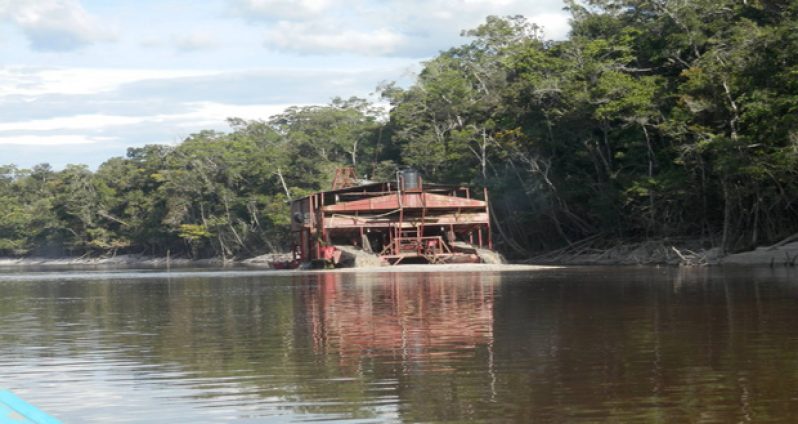THE people of Jawalla, a native Akawaio community in Region 7, say they are prepared to fight a decision by the Supreme Court which bars them from having any say regarding mining operations which threaten their way of life.The mining operations were allowed by way of a special agreement between the miner and the Mines Division of the regulatory body,the Guyana Geology and Mines Commission (GGMC), which is responsible for granting licences. Given that special agreement, the mining company called Timna Mining Incorporated, run by James Krakowsky, did not have a prospecting licence to investigate the area for minerals, which is the usual first step in the process to being given permission to mine.

This also means that the company did not have the usual legal permission to undertake small, medium or large-scale mining. Armed with the special mining permit, the company has a dredge on the Mazaruni River where it is carrying out mining operations. The Jawalla community had moved to the courts to prevent the company from mining along the rivers they depend on, including the Mazaruni, but Chief Justice (ag) Ian Chang and Puisne Judge Rishi Persaud ruled that the village does not own, possess or control the river. “It is clear that the Mazaruni River is not part and parcel of the village lands of Jawalla,” the two judges said in their judgement last Friday.
“It also appears that the Mazaruni River does not pass through the village lands of Jawalla or lands contiguous with the village lands of Jawalla.” Further, they ruled that the Mazaruni River appears to “pass along” rather than “through” the village.
“Every day I am seeing the river running through the village lands,” said Bernidette Hernandez, who was born at Jawalla and spent all of her 30 years of life there. “So for the [Court] to make that kind of ruling is atrocious,” Hernandez told reporters in Georgetown, saying that residents of Jawalla live on both banks of the Mazaruni River. “We understand and know the names of the rivers and [in] what direction they flow; so it is appalling for [them] to have that kind of grounds for his ruling,” she stated.
Jawalla received a title to its land from then President Desmond Hoyte on November 8, 1991. Harold Brown, a 67-year-old retired teacher displayed a plan of the village as produced by the Guyana Lands and Surveys Commission, which shows the Mazaruni passing through the village. That plan was dated June 12, 2012. “Mazaruni runs through the whole land; this is nothing at the side. “This is almost in the middle of Jawalla land. “I don’t think anybody looked at the map when making that ruling or maybe they looked at a wrong map,” said Brown.
What is even more baffling for Jawalla is the fact that no representative of the village was called before the Chief Justice before he handed down his ruling, the Toshao or village leader Weiton Williams said.
Jawalla residents use the river for mainly washing and swimming, but those who live on the banks of the Mazaruni River also use it to cook, since a clean water source – the Kukui River – is a great distance away.
The village council claims that the GGMC granted the company permission to carry out its activities without their prior consent, which they say is a violation of the Amerindian Act.
The village leader said that the mining company operates a “cutter head” dredge, which, apart from building up sand in the river, inhibits the free flow of transportation along the river, and also causes “great damage to the environment and to the river.”
Jawalla wants the government to step in and assist in their cause, even as they are prepared to take the matter all the way to the final court of appeal for Guyana – the Caribbean Court of Justice, to have the matter resolved. “To use our lands and waters in a sustainable way has been our way of life for generations; and we call on the State to respect and protect our way of life for our children and for all of Guyana,” the Village Council stated.
By Neil Marks



.jpg)








